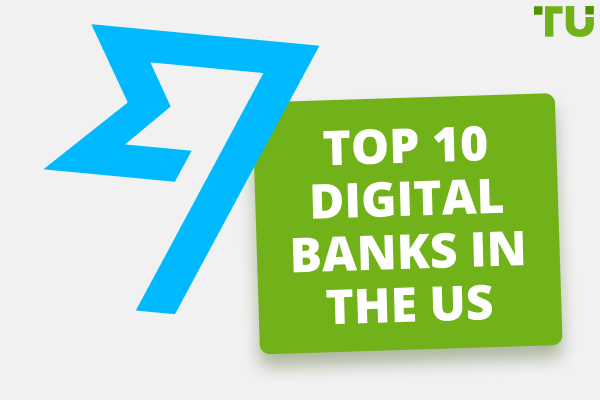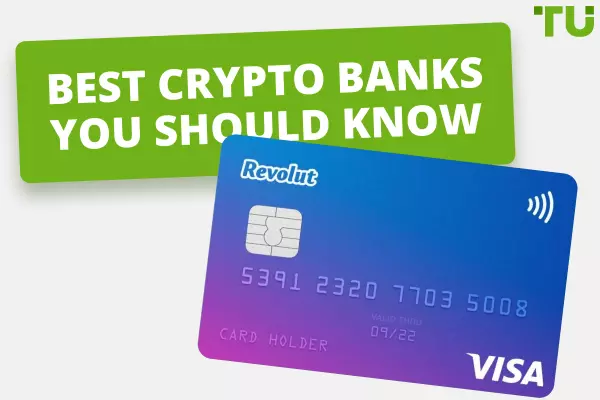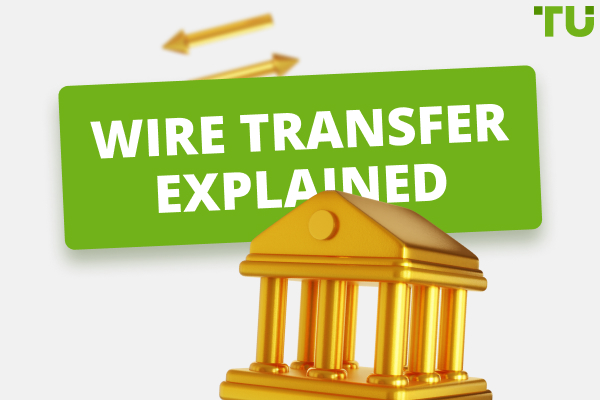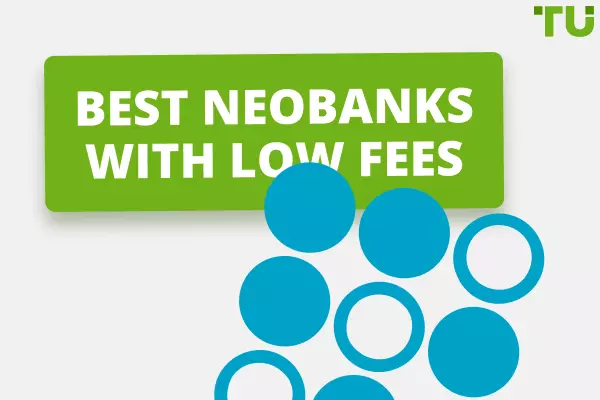Best online banks with the lowest fees
The first platform related to online banking was launched in 1999. Since then, most banking services have moved to the internet, creating a separate segment of services for retail clients and businesses called "online banking". Along with the online banking services offered by conventional banks, digital platforms have entered the market, and some clients have switched to them.
From this review you will learn:
What are online banks and their types?
How do online banks differ from online banking?
Pros and cons of digital online banks.
What are the banking products offered through online platforms?
Types of fees charged by digital online banks.
Security measures for client accounts opened through online banks.
Also, this Traders Union review contains a brief description of the best digital banks, and if you like, you can open an account for free.
Start Working with Digital Banks Now with the Wise Bank!What are online banks?
Digital online banks are platforms that provide clients with banking services over the internet. The client registers on the platform, passes verification, and uses the services through a mobile app or user account from a PC.
There are two types of online banks:
-
Neobanks. These are online banks that operate only on the internet. They don't have physical offices, and access to the service is provided only through mobile devices or PCs. All communication with bank employees and registration of services is carried out only via the internet. Also, online banks may not be licensed by the regulator;
-
Challenger banks. These are online banks that can be independent units of large conventional banks. This category also includes banks established based on failed banks or highly specialized platforms that occupy a sector that is not typical of conventional banks. They are licensed by regulators.
The above categories are not clearly defined, because in some sources you may find the use of both above concepts as synonyms.
Best Crypto-Friendly Banks You Should KnowTop 7 best online banks with low fees
In this section you will find a brief review of the best digital banks that have several common features:
They are fully featured neobanks based on digital technologies and provide almost the entire range of banking services;
They are licensed by financial regulators;
They have the best range of banking products with flexible tariff schedules.
You can register in just five minutes and get more information about the offers of these digital banks in your user account.
Revolut
Revolut is one of the fastest-growing digital banks in Europe. The platform describes itself as a "Home bank for managing your capital". The emphasis in the product line is put on debit cards accepted in more than 150 countries, budgeting, and personal budget planning services. There are also unique services that are not common for conventional banks, such as pet insurance, and investment in cryptocurrencies, stocks, or assets in commodity markets.
Pros of Revolut digital bank:
-
Free multi-currency account. It allows for the storage of up to 30 currencies. There are minimal fees for international transfers and conversions compared to the average market rates;
-
Savings plans. The rate on savings accounts is up to 1.67%, with the ability to withdraw money without a fee at any time;
-
Payment solutions for businesses. The payment gateway for an online store, access to over-the-counter markets, salary projects, etc.;
-
The possibility of investing with a low entry barrier. From $1 (investing in stocks is available only for UK residents).
Cons of the Revolut digital bank:
-
There are paid plans. If you want to get the most favorable rates on savings accounts and reduce fees, you should pay for the tariff plan. This encourages clients to make more turnover on accounts and accumulate more funds in savings accounts;
-
There is a fixed fee for certain international payment directions.
The digital bank is regulated by FCA (UK).
Wise
Wise is one of the most popular digital banks. It is focused on domestic and international payments. The platform does not provide loans, and there is no interest rate on deposits. But Wise lets you transfer money faster than any other platform, almost anywhere in the world with a minimum fee. To date, the platform has more than 10 million users in 170 countries. The platform is licensed by the UK regulatory agency, the FCA.
Pros of the Wise digital bank:
-
Worldwide presence and partnerships with many banks. Using the payment app, you can transfer money to almost any country. Also, thanks to the partnerships with national banks and payment systems, the recipient can withdraw money with a minimum fee and without intermediaries;
-
Low fees. Plus, it offers full transparency. The calculator shows the final amount for the recipient at the online rate, taking into account all fees;
-
Functionality. The system has a multi-currency wallet where you can store funds and make internal transfers in over 50 currencies;
-
High level of e-wallet protection. Throughout the existence of the system, no client money has been lost due to hacking as a result of Wise’s fault.
Cons of the Wise digital bank:
-
There are no loan products;
-
Slow transfers to some countries. A money transfer to certain countries may take up to 3-4 days. However, the system warns about this at the time of completing the transfer details.
The platform operates with conventional banks worldwide. It can be seen among partners of such systems as Visa, MasterCard, and Western Union.
CIT Bank
CIT Bank is a completely online neobank focused on providing capital accumulation services. The platform has a dedicated range of savings accounts with a flexible tariff schedule and is suited for various categories of clients. Loan products are limited to mortgages.
Pros of the CIT digital bank:
-
Reliability. State regulation and participation in the FDIC's federal compensation scheme;
-
No fees and debit card maintenance fees. Multilevel interest rates on savings accounts, refund of fees when withdrawing cash from partnered ATMs in the USA.
Cons of the CIT digital bank:
-
Registration is only available to residents of the USA.
The main category of clients is people who rarely travel outside the United States and want to have access to their deposits at any time.
Bunq
Bunq is a relatively young online bank, describing itself as a platform for everyday settlements and capital accumulation. The emphasis is placed on the possibility of multi-currency storage of money in 16 currencies with an interest rate of 0.27%. MasterCard and Wise are partnered payment networks.
Pros of Bunq digital bank:
-
Flexible pricing. The bank offers eight plans: four for retail clients and four for businesses. Three retail plans with advanced features have a fixed monthly fee;
-
The bank is licensed by the Central Bank of the Netherlands;
-
The ability to withdraw money at any time. This feature does not depend on the tariff plan;
-
Investment products. Two tariff plans for retail clients provide the opportunity to invest in stocks.
Cons of the Bunq digital bank:
-
Loan programs are not provided;
-
Premium plans are expensive.
Currently, verification is available to residents of a limited number of countries. However, the platform plans to expand its coverage in the future.
Monzo
Monzo is one of the first neobanks in the UK to receive an FCA license and it attracts more than 6 million clients. The platform is a payment system with a basic set of debit card services. There are several types of accounts on which the tariff schedule depends. The main types of services are domestic and international payments, as well as short-term lending.
Pros of the Monzo digital bank:
-
Low fees. Thanks to the partnership with banks in the USA and Europe, money can be withdrawn from the Monzo card without a fee within the limit set by the account;
-
There are savings accounts with relatively high rates of return, which include up to 2.57% with savings on the accrued interest tax rate (ISA);
-
There are plans for businesses. The plans provide the possibility of creating virtual maps, connecting accounting tools, etc.
Cons of the Monzo digital bank:
-
Most of the services are intended for UK residents only. Residents of the United States can pass verification in a limited mode;
-
The most favorable conditions are offered for paid accounts.
Additionally, there is a compensation fund with an insurance amount of up to 85,000 pounds.
Monese
Monese is a young UK neobank operating in European countries. In 2016, the bank issued its first debit card, and today it has a client base of more than 1 million people. The bank offers three types of plans, two of which have a fixed subscription fee. Paid plans offer a zero fee for withdrawing money, the absence of a limit for depositing into the account, as well as a reduced conversion fee.
Pros of the Monese digital bank:
-
Instant transfers worldwide. The bank's partner is PayPal;
-
There are short-term loans. To build a positive credit record, the bank offers a small loan of up to £600 at 28.2% per annum without checking your creditworthiness.
Cons of the Monese digital bank:
-
A limited number of currencies. The wallet supports only the Euro, British pound, and Romanian leu;
-
A high rate for paid plans.
The bank is suitable for those who make frequent payments without the need to convert funds into euros or British pounds.
SoFi Bank
SoFi Bank is an online bank founded in the USA in 2011. It is a universal digital platform that covers almost all types of conventional banking services. Here you can remotely apply for several types of loans (reduced interest rates apply for student loans and medical loans). There are even special loans for weddings or travel purposes. The platform also offers insurance and investment services of many types. Using the app features, you can buy shares of companies or ETF funds without a fee for an amount starting at $5. There are products for large clients, like budgeting or developing the structure of the investment portfolio. As for businesses, the platform offers loan facilities and short-term loans.
Advantages of the SoFi digital bank:
-
Favorable tariff policy. In terms of the range of banking services, SoFi Bank is almost as good as many conventional banks. Moreover, thanks to digital technologies, the bank has optimized its administration and operating costs by reducing fees and interest rates for its clients;
-
Issuance of MasterCard payment system credit cards. It is a combination of reliability, freedom of action, and low fees. The card is accepted by many ATMs in the USA and Europe;
-
Also, there is an opportunity for additional savings. Active members of the digital bank community receive discounts on trust management plans, free advice from career development specialists, etc.
-
It has a unique product range.
Cons of the SoFi digital bank:
-
Only US residents can register on the platform.
A little extra: If you are a student and want to refinance your debt with another bank, SoFi will give you $300, which may be credited to repay the debt.
A comparative table of the main parameters of digital banks.
| Digital bank | Loan rate | Credit rate | Supported currencies |
|---|---|---|---|
Revolut |
0.65%-0.7% |
6.45% |
30 currencies |
Wise |
Not applicable |
Not applicable |
54 currencies |
CIT |
From 0.1% |
0.1% - 1.4% |
USD |
Banq |
The bank does not issue loans |
0.09% APY |
Euro (16 European currencies in the Easy Money plan) |
Monzo |
0-19% |
1.16%-1.50% |
GBP |
Monese |
Individual |
28.2% |
GBP, EUR, and RON |
SoFi |
1.89%-22.23% |
0.90%-1.50% |
USD |
Differences between online and conventional banks
Online banking offered by conventional banks is an optional service that allows you to manage your money, connect to settlement and cash services (SCS), issue loans, or use other services via the internet. In contrast, many services in a conventional bank involve regular contact with employees in a physical branch. Online banks do not involve physical communication with clients.
The main differences between digital and conventional banks are:
-
Low fees. Online banks save on administrative expenses, so they do not incur expenses for fixed assets, maintenance of the transport fleet, etc.;
-
Also, a limited range of products is offered.
-
Conventional banks are banks offering a wide range of services, while online banks mostly offer debit or credit cards of various types (with cash back for everyday expenses, accumulation of miles for travelers, etc.), savings accounts, retirement savings options, or insurance services.
-
Individual challenger banks focus on a particular service such as only consumer lending, mortgages, etc.;
-
Neobanks have simpler and faster verification, credit risk assessment, and digital paperwork procedures, as well as convenience for the client. Neobank services can be used at any time from almost anywhere in the world.
Neobanks can operate under several models. The model with a full-fledged banking license assumes full control over the work of the neobank by the regulator. The cooperation model assumes that the neobank provides only technological solutions while the risks are borne by partner banks. A hybrid model is when a neobank works in tandem with a conventional bank and has a license to provide limited services.
10 Best Credit Cards - Fees and Bonuses ComparedClient products offered by digital online banks
Online banks offer the following service types:
-
Credit cards. It is one of the main services for everyday life. Cards can be issued under the brand of a bank, but most often, a neobank acts only as an issuer, working in partnership with Visa or MasterCard payment systems. The range of credit cards can offer more than 10 options – cards for travelers, student cards, cash back cards for everyday expenses, cards with a reduced conversion fee, partner cards, etc.;
-
Savings accounts. An analog of classic deposits. In addition to standard accounts, there are accounts for children and retirement saving accounts with a fixed interest rate or compound interest;
-
Loans (the service is not available at all digital banks) such as car loans, refinancing, mortgages, overdrafts, etc.;
-
Insurance for cars, life, real estate, etc.
Also, many neobanks provide a set of services for businesses. For example, in a business app, you can set tax deductions from payments, automatically generate statements, integrate a banking app into special transaction accounting programs (such as Xero and FreeAgent), generate invoices, set budgets for different transaction categories, and so on.
Best Online Banks in IndiaCredit cards of online banks as opportunities for clients
Credit cards are one of the key products of digital banks. Using them through the app, you can, in just a few clicks, pay for goods and services in online stores, transfer money abroad in almost any currency, withdraw funds from ATMs in other countries, etc. The credit card limit is determined by the creditworthiness of the borrower. The difference between the cards is in the interest rate, the amount of cash back in partner networks, the introductory interest-free period, fees for transactions and cash withdrawals, as well as maintenance fees, if any.
To choose a card, you need to ask yourself a few questions such as how often and for what purposes will you use the loan limit (do you need a conversion, are you going to use the card in other countries, etc.). The final amount of fees that you will pay to your bank and partner bank is also important if the money is converted through other payment systems. You can issue multiple virtual credit cards, link them to the Curve app, and activate the one with the lowest fees for your transaction types as your primary card.
How to Send Money Internationally? 10 Cheap and Fast OptionsInvestment products of online banks
The investment products offered by digital banks are savings and accumulation accounts, which are similar to deposits. They differ from each other in the following parameters:
Type of savings account. In addition to standard accumulation accounts, there are accounts for children with a shared parent profile. These accounts offer a lower interest rate, but more favorable conditions. For example, a compound interest rate, the possibility of withdrawing small amounts at any time without fees, etc.;
The type of interest rate, for example, simple or compound interest;
Tariff schedule. The APY, depending on the account, can be 0.3%-3.5% per annum.
In addition, there may be conditions on certain accounts for the minimum balance amount, which can range from $1,000 to $2,500.
Safety of digital banks compared to conventional banks
According to the statistics over the last three years, digital bank client accounts are only 10% more likely to be hacked. This is because conventional banks can finance the development of technological means to protect information transmission channels. But this does not mean that online banks pose a greater risk to their users. Most digital platforms and neobanks are licensed by regulators. In the UK, for example, it could be the FCA. This means that the bank is obliged to comply with all requirements to ensure the safety of the client's funds.
Protection of client funds by digital banks:
-
Deposit insurance. Each country has its own insurance funds, to which banks with local registration are required to contribute. For example, these are the FDIC and NCUA funds in the US, or the FSCS in the UK. The amount of insurance can vary from $80,000 to $250,000. The platform's membership in these funds is an additional advantage;
-
Two-factor authentication. This is an additional level of protection to the client's digital account password. In addition to a complex password (over 8 digits, uppercase letters, numbers, and special symbols), there is additional protection – confirmation of password entry using a code sent to the phone or email;
-
Biometric protection. Login to your account by fingerprint or retina scan. This type of protection is offered by a few banks, so it is an additional advantage;
-
Control via notifications. In the event of login to your profile or unauthorized use of the card account, you will be notified via phone or email;
-
CSS encryption. Encryption of data on payment gateways to exclude interception of information and account hacking.
Online banks are no less trustworthy than conventional ones. This confirms the fact that there are almost no cases where a client loses money through the fault of the bank.
Best International Banks For Active TravelersPayment systems as an alternative to digital banks
Payment systems can be considered as an alternative to digital banks. Unlike banks, they are intended for a narrower task – domestic and international money transfers with or without conversion.
Comparison of pros and cons between payment systems and digital banks:
-
Multi-currency electronic wallet. Online banks, in most cases, work only with domestic or freely convertible currencies. Many payment systems allow you to transfer to and convert currencies of more than 100 countries;
-
Transaction speed. Online banks can transfer money in about 3-4 days or more. Payment systems can transfer money from a few hours up to 3 days;
-
Simple cost calculation. Online calculators of payment systems allow you to estimate the final amount.
Choose payment systems if you are only interested in money transfer services. Examples of the best payment systems with minimal fees are Wise, Skrill, and PayPal.
Conclusion. Online banks are a more convenient alternative to conventional banking due to access to financial services 24 hours a day from anywhere in the world. The main criteria for choosing digital banks are tariff policy and transparency, the range of banking products, and the availability of a license from the financial regulator.
FAQ
What is the difference between online and classic banks?
Conventional commercial banks have a physical network of branches located in cities all over the country where the bank operates. They work mostly with clients in the country in which they are registered. On the other hand, there are online banks that are divided into two types: neobanks and challenger banks. Neobanks work exclusively on the web and act as fully independent platforms. They have no physical branches, so a person can open an account on a digital platform from the jurisdiction of any region (with the rare exception of certain countries). Challenger banks are banks that can be a digital online part of a large conventional commercial bank.
What services do online banks offer?
Most digital platforms offer a standard basic set of classic bank services such as debit card issuance, domestic and international payment services, life and property insurance, overdrafts, and short-term consumer lending (rare services are mortgages or refinancing). Legal entities may have a dedicated set of additional services, such as support for settlements with counterparties and tax agent services.
What is the advantage of online banks compared to classic banks?
Online banks exist mainly on the web (and some are only on the web). Therefore, they incur fewer administrative expenses and can set lower fees. Digital platforms have less intrusive verification conditions and fewer requirements for transaction limits. However, there are also disadvantages, such as a limited range of services. Most neobanks do not have lending services.
Who can use online banking services?
Online banks are suitable for retail clients who primarily need the services of instant domestic and international payments, the execution of transactions using debit cards, management of accounts through mobile apps, and the service of short-term overdrafts.
Team that worked on the article
Oleg Tkachenko is an economic analyst and risk manager having more than 14 years of experience in working with systemically important banks, investment companies, and analytical platforms. He has been a Traders Union analyst since 2018. His primary specialties are analysis and prediction of price tendencies in the Forex, stock, commodity, and cryptocurrency markets, as well as the development of trading strategies and individual risk management systems. He also analyzes nonstandard investing markets and studies trading psychology.
Olga Shendetskaya has been a part of the Traders Union team as an author, editor and proofreader since 2017. Since 2020, Shendetskaya has been the assistant chief editor of the website of Traders Union, an international association of traders. She has over 10 years of experience of working with economic and financial texts. In the period of 2017-2020, Olga has worked as a journalist and editor of laftNews news agency, economic and financial news sections. At the moment, Olga is a part of the team of top industry experts involved in creation of educational articles in finance and investment, overseeing their writing and publication on the Traders Union website.
Olga has extensive experience in writing and editing articles about the specifics of working in the Forex market, cryptocurrency market, stock exchanges and also in the segment of financial investment in general. This level of expertise allows Olga to create unique and comprehensive articles, describing complex investment mechanisms in a simple and accessible way for traders of any level.
Olga’s motto: Do well and you’ll be well!
















